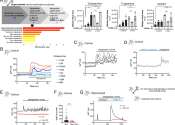Researchers find potential genetic marker linked to better survival outcomes in patients with head and neck cancer
Researchers from the UCLA Health Jonsson Comprehensive Cancer Center have shown for the first time that a gene usually linked to giant axonal neuropathy, a rare and severe neurological condition, also plays a role in inhibiting ...
Feb 29, 2024
0
10









